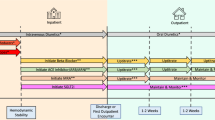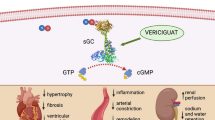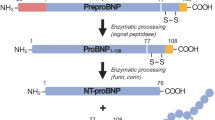Abstract
Heart failure is an increasingly common disease associated with significant morbidity and mortality in the aging population. Recent advances in heart failure pharmacotherapy have established several agents as beneficial to disease progression and outcomes. However, current consensus guideline-recommended pharmacotherapy may not represent an optimal treatment strategy in all heart failure patients. Specifically, individuals with genetic variation in regions central to mediation of beneficial response to standard heart failure agents may not receive optimal benefit from these drugs. Additionally, targeted approaches in phase 3 clinical trials that select patients for inclusion based on the genotype most likely to respond might advance the currently stalled drug development pipeline in heart failure. This article reviews the literature in heart failure pharmacogenetics to date, opportunities for discovery in recent and upcoming clinical trials, as well as future directions in this field.

Similar content being viewed by others
Abbreviations
- A-HeFT:
-
African American Heart Failure Trial
- BEST:
-
β-Blocker Evaluation in Survival Trial
- CHARM:
-
Candesartan in Heart Failure: Assessment of Reduction in Mortality and Morbidity
- MERIT-HF:
-
Metoprolol CR/XL Randomized Intervention Trial in Heart Failure
- RALES:
-
Randomized Aldactone Evaluation Study
- TOPCAT:
-
Aldosterone Antagonist Therapy for Adults with Heart Failure and Preserved Systolic Function
References
Papers of particular interest, published recently, have been highlighted as: • Of importance •• Of major importance
Hunt SA, Abraham WT, Chin MH, et al. 2009 Focused update incorporated into the ACC/AHA 2005 Guidelines for the Diagnosis and Management of Heart Failure in Adults A Report of the American College of Cardiology Foundation/American Heart Association Task Force on Practice Guidelines Developed in Collaboration With the International Society for Heart and Lung Transplantation. J Am Coll Cardiol. 2009;53:e1–90.
Hjalmarson A, Goldstein S, Fagerberg B, et al. Effects of controlled-release metoprolol on total mortality, hospitalizations, and well-being in patients with heart failure: the Metoprolol CR/XL Randomized Intervention Trial in congestive heart failure (MERIT-HF). MERIT-HF Study Group. JAMA. 2000;283:1295–302.
Poole-Wilson PA, Swedberg K, Cleland JG, et al. Comparison of carvedilol and metoprolol on clinical outcomes in patients with chronic heart failure in the Carvedilol Or Metoprolol European Trial (COMET): randomised controlled trial. Lancet. 2003;362:7–13.
Committees CIIa. The Cardiac Insufficiency Bisoprolol Study II (CIBIS-II): a randomised trial. Lancet. 1999;353:9–13.
• Triposkiadis F, Karayannis G, Giamouzis G, Skoularigis J, Louridas G, Butler J. The sympathetic nervous system in heart failure physiology, pathophysiology, and clinical implications. J Am Coll Cardiol. 2009;54:1747–62. This is a review of sympathetic nervous system changes in heart failure that also addresses adrenergic receptor polymorphisms and their impact on response to pharmacotherapy.
Xiao RP. Beta-adrenergic signaling in the heart: dual coupling of the beta2-adrenergic receptor to G(s) and G(i) proteins. Sci STKE. 2001;2001:re15.
Mason DA, Moore JD, Green SA, Liggett SB. A gain-of-function polymorphism in a G-protein coupling domain of the human beta1-adrenergic receptor. J Biol Chem. 1999;274:12670–4.
Rathz DA, Gregory KN, Fang Y, Brown KM, Liggett SB. Hierarchy of polymorphic variation and desensitization permutations relative to beta 1- and beta 2-adrenergic receptor signaling. J Biol Chem. 2003;278:10784–9.
Mialet Perez J, Rathz DA, Petrashevskaya NN, et al. Beta 1-adrenergic receptor polymorphisms confer differential function and predisposition to heart failure. Nat Med. 2003;9:1300–5.
Chen L, Meyers D, Javorsky G, et al. Arg389Gly-beta1-adrenergic receptors determine improvement in left ventricular systolic function in nonischemic cardiomyopathy patients with heart failure after chronic treatment with carvedilol. Pharmacogenet Genomics. 2007;17:941–9.
Terra SG, Hamilton KK, Pauly DF, et al. Beta1-adrenergic receptor polymorphisms and left ventricular remodeling changes in response to beta-blocker therapy. Pharmacogenet Genomics. 2005;15:227–34.
de Groote P, Helbecque N, Lamblin N, et al. Association between beta-1 and beta-2 adrenergic receptor gene polymorphisms and the response to beta-blockade in patients with stable congestive heart failure. Pharmacogenet Genomics. 2005;15:137–42.
• Metra M, Covolo L, Pezzali N, et al. Role of beta-adrenergic receptor gene polymorphisms in the long-term effects of beta-blockade with carvedilol in patients with chronic heart failure. Cardiovasc Drugs Ther. 2010;24:49–60. This is the largest and most recent study evaluating ADRB2 polymorphisms relative to LVEF response.
Liggett SB, Mialet-Perez J, Thaneemit-Chen S, et al. A polymorphism within a conserved beta(1)-adrenergic receptor motif alters cardiac function and beta-blocker response in human heart failure. Proc Natl Acad Sci USA. 2006;103:11288–93.
Green SA, Turki J, Innis M, Liggett SB. Amino-terminal polymorphisms of the human beta 2-adrenergic receptor impart distinct agonist-promoted regulatory properties. Biochemistry. 1994;33:9414–9.
Green SA, Turki J, Bejarano P, Hall IP, Liggett SB. Influence of beta 2-adrenergic receptor genotypes on signal transduction in human airway smooth muscle cells. Am J Respir Cell Mol Biol. 1995;13:25–33.
Troncoso R, Moraga F, Chiong M, et al. Gln(27)–>Glu beta(2)-adrenergic receptor polymorphism in heart failure patients: differential clinical and oxidative response to carvedilol. Basic Clin Pharmacol Toxicol. 2009;104:374–8.
Kaye DM, Smirk B, Williams C, Jennings G, Esler M, Holst D. Beta-adrenoceptor genotype influences the response to carvedilol in patients with congestive heart failure. Pharmacogenetics. 2003;13:379–82.
Biolo A, Clausell N, Santos KG, et al. Impact of beta1-adrenergic receptor polymorphisms on susceptibility to heart failure, arrhythmogenesis, prognosis, and response to beta-blocker therapy. Am J Cardiol. 2008;102:726–32.
•• Cresci S, Kelly RJ, Cappola TP, et al. Clinical and genetic modifiers of long-term survival in heart failure. J Am Coll Cardiol. 2009;54:432–44. This is the largest prospective cohort study evaluating genetic polymorphisms relative to outcomes in a heart failure population.
Sehnert AJ, Daniels SE, Elashoff M, et al. Lack of association between adrenergic receptor genotypes and survival in heart failure patients treated with carvedilol or metoprolol. J Am Coll Cardiol. 2008;52:644–51.
White HL, de Boer RA, Maqbool A, et al. An evaluation of the beta-1 adrenergic receptor Arg389Gly polymorphism in individuals with heart failure: a MERIT-HF sub-study. Eur J Heart Fail. 2003;5:463–8.
Levin MC, Marullo S, Muntaner O, Andersson B, Magnusson Y. The myocardium-protective Gly-49 variant of the beta 1-adrenergic receptor exhibits constitutive activity and increased desensitization and down-regulation. J Biol Chem. 2002;277:30429–35.
Magnusson Y, Levin MC, Eggertsen R, et al. Ser49Gly of beta1-adrenergic receptor is associated with effective beta-blocker dose in dilated cardiomyopathy. Clin Pharmacol Ther. 2005;78:221–31.
Neumeister A, Charney DS, Belfer I, et al. Sympathoneural and adrenomedullary functional effects of alpha2C-adrenoreceptor gene polymorphism in healthy humans. Pharmacogenet Genomics. 2005;15:143–9.
Small KM, Forbes SL, Rahman FF, Bridges KM, Liggett SB. A four amino acid deletion polymorphism in the third intracellular loop of the human alpha 2C-adrenergic receptor confers impaired coupling to multiple effectors. J Biol Chem. 2000;275:23059–64.
Small KM, Wagoner LE, Levin AM, Kardia SL, Liggett SB. Synergistic polymorphisms of beta1- and alpha2C-adrenergic receptors and the risk of congestive heart failure. N Engl J Med. 2002;347:1135–42.
•• Bristow MR, Murphy GA, Krause-Steinrauf H, et al. An alpha2C-adrenergic receptor polymorphism alters the norepinephrine-lowering effects and therapeutic response of the beta-blocker bucindolol in chronic heart failure. Circ Heart Fail. 2010;3:21–8. This is a genetic substudy of the randomized BEST evaluating the α 2 c Del322-325 polymorphism in heart failure subjects relative to bucindolol or placebo.
Lobmeyer MT, Gong Y, Terra SG, et al. Synergistic polymorphisms of beta1 and alpha2C-adrenergic receptors and the influence on left ventricular ejection fraction response to beta-blocker therapy in heart failure. Pharmacogenet Genomics. 2007;17:277–82.
•• Liggett SB, Cresci S, Kelly RJ, et al. A GRK5 polymorphism that inhibits beta-adrenergic receptor signaling is protective in heart failure. Nat Med. 2008;14:510–7. An exemplary model of investigation, the authors thoroughly define the phenotype of This paper discusses GRK5 Gln41Leu with increasingly complex functional studies and two independent clinical cohorts.
ARCA Biopharma: ARCA Announces Special Protocol Assessment Agreement with FDA for Bucindolol Development in Genotype-Defined Heart Failure Population. (Accessed January 2011, at http://phx.corporate-ir.net/phoenix.zhtml?c=109749&p=irol-newsArticle&ID=1427666&highlight).
• Beitelshees AL, Zineh I. Renin-angiotensin-aldosterone system (RAAS) pharmacogenomics: implications in heart failure management. Heart Fail Rev. 2010;15:209–17. This is a comprehensive review of RAAS genes and pharmacogenetics in heart failure.
Rigat B, Hubert C, Alhenc-Gelas F, Cambien F, Corvol P, Soubrier F. An insertion/deletion polymorphism in the angiotensin I-converting enzyme gene accounting for half the variance of serum enzyme levels. J Clin Invest. 1990;86:1343–6.
Winkelmann BR, Nauck M, Klein B, et al. Deletion polymorphism of the angiotensin I-converting enzyme gene is associated with increased plasma angiotensin-converting enzyme activity but not with increased risk for myocardial infarction and coronary artery disease. Ann Intern Med. 1996;125:19–25.
McNamara DM, Holubkov R, Postava L, et al. Pharmacogenetic interactions between angiotensin-converting enzyme inhibitor therapy and the angiotensin-converting enzyme deletion polymorphism in patients with congestive heart failure. J Am Coll Cardiol. 2004;44:2019–26.
Cicoira M, Zanolla L, Rossi A, et al. Failure of aldosterone suppression despite angiotensin-converting enzyme (ACE) inhibitor administration in chronic heart failure is associated with ACE DD genotype. J Am Coll Cardiol. 2001;37:1808–12.
Cicoira M, Rossi A, Bonapace S, et al. Effects of ACE gene insertion/deletion polymorphism on response to spironolactone in patients with chronic heart failure. Am J Med. 2004;116:657–61.
Granger SP, Bengtsson O, et al. Abstract 844: no clear association between candidate gene variants and outcomes in 3239 patients with chronic heart failure: results from the CHARM program. Circulation. 2008;118(S):S623–4.
McNamara DM, Tam SW, Sabolinski ML, et al. Abstract 3173: The ACE D allele and clinical outcomes in African Americans with heart failure. Circulation. 2006;114:671–2.
A Pharmacogenomic Study of Candesartan in Heart Failure. (Accessed December, 2010, at http://clinicaltrials.gov/ct2/show/NCT00400582).
Aldosterone Antagonist Therapy for Adults With Heart Failure and Preserved Systolic Function (TOPCAT). (Accessed December, 2010, at http://clinicaltrials.gov/ct2/show/NCT00094302).
Dishy V, Sofowora GG, Xie HG, et al. The effect of common polymorphisms of the beta2-adrenergic receptor on agonist-mediated vascular desensitization. N Engl J Med. 2001;345:1030–5.
Chong LK, Chowdry J, Ghahramani P, Peachell PT. Influence of genetic polymorphisms in the beta2-adrenoceptor on desensitization in human lung mast cells. Pharmacogenetics. 2000;10:153–62.
Shin J, Lobmeyer MT, Gong Y, et al. Relation of beta(2)-adrenoceptor haplotype to risk of death and heart transplantation in patients with heart failure. Am J Cardiol. 2007;99:250–5.
Johnson JA, Liggett SB. Cardiovascular pharmacogenomics of adrenergic receptor signaling: clinical implications and future directions. Clin Pharmacol Ther. 2011;89(3):366–78.
Disclosure
Conflicts of interest: H.M. Davis: is a part-time pharmacist for CVS Pharmacy; J.A. Johnson: none.
Author information
Authors and Affiliations
Corresponding author
Rights and permissions
About this article
Cite this article
Davis, H.M., Johnson, J.A. Heart Failure Pharmacogenetics: Past, Present, and Future. Curr Cardiol Rep 13, 175–184 (2011). https://doi.org/10.1007/s11886-011-0181-6
Published:
Issue Date:
DOI: https://doi.org/10.1007/s11886-011-0181-6




